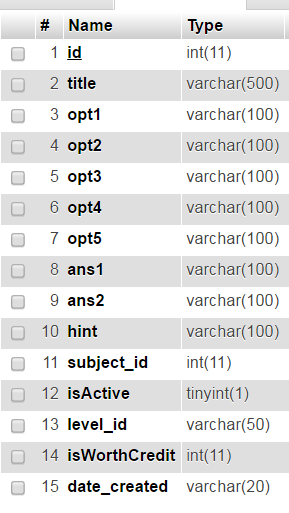I am making an app than has an exam center... I am aware of the database normalization concepts...but in my case it looks like I need to store non atomic values in a column. Actually the app will have 2 screens -
Exam packs (that contains a set of questions) e.g. Kids Science, Modern Physics, History etc.
Custom Exams...where one can pick subjects and then conduct an exam.
So... ofcourse there should be a table called questions with
Now I have to fetch some out of these questions if user selects an Exam pack or set of subjects. It was clean till the Exam Pack was into picture. Now I have two options:
Create a columns called questions in exam_packs table that will contain the comma separated ques_ids or an array.
Create separate tables for each exam_pack with questions in them... by doing so..these questions could not be available for users taking exam by subject.
Any suggestions are welcome.

